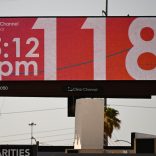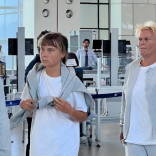Trump's BRICS warning to India adds new twist to trade deal
Bangladesh blocks internet as more violence and protests expected

Image: BBC
Summary
- At least 90 people have been killed and hundreds more injured in clashes between police and tens of thousands of anti-government protesters in Bangladesh on Sunday
- The unrest comes as student leaders have declared a campaign of civil disobedience to demand that the nation’s long-serving leader Prime Minister Sheikh Hasina step aside
- Internet services have been completely cut ahead of the “Long March to Dhaka” starting from Shaheed Minar, a national monument in the capital
- The death toll includes at least 13 police officers, and an indefinite nationwide curfew has been put in place to curb further violence
- The student protest – which has been ongoing since July – started with calls to abolish quotas in civil service jobs, but has since transformed into a much wider anti-government movement
- At least 280 people have died as a result of the unrest so far, which has prompted the government to restrict access to internet services in some parts of the country
- The UN has called for an end to the “shocking violence” and urged restraint from Bangladeshi politicians and security forces
- Broadband internet goes offline across the nation
As we reported earlier, broadband internet has been disconnected across Bangladesh, following an earlier shutdown of the mobile internet service.
Internet service providers say bandwidth supply from submarine cables and international terrestrial cables (ITCs) has also been cut off.
While service providers typically sever internet service on the orders of the government, two officials from the Bangladesh Telecommunication Regulatory Commission told BBC Bangla that they do not have any information about the blackout.
Commission Secretary Noor-i Khawaja said he only learned about the broadband service going offline after he saw it reported on television.
Broadband service was completely stopped around 10:30am, but had already been slow earlier on Monday morning.
4G mobile internet service has been offline since Sunday afternoon.
An indefinite nationwide curfew continues.
- Police fire tear gas shells and sound grenades: Report
Police have fired sound grenades and tear gas shells at protesters as they marched toward the central Dhaka neighbourhood of Shahbagh, according to Bengali publication Protho Malo.
The protesters had just reached Chankharpul intersection, a busy road near one of Bangladesh’s busiest overpasses, when authorities opened fire.
Tens of thousands of anti-discrimination protesters are currently on the move in what has been dubbed the “Long March to Dhaka”.
- Army chief set to give address
Bangladesh army chief Waker-uz-Zaman is set to address the country at 0800 GMT (0900 BST).
Army units have currently been deployed across various parts of the capital city in a bid to bolster its security.
- Updates near impossible amid blackout
It is currently very difficult to get any updates out of Bangladesh.
The government appears to have initiated a complete internet shutdown, blocking outside access to local web pages.
The BBC’s Bengali service last spoke to our colleagues in Dhaka about two hours ago, but has not been able to hear back from them since.
According to Internet outage monitoring site NetBlocks, the country is “in the midst of a near-total internet shutdown”.
- Protesters begin march in Dhaka
Thousands of protesters have started marching in the Uttara suburb of the capital, chanting and demanding Prime Minister Sheikh Hasina’s resignation – under the watchful eye of army personnel and police officers who are stationed across various points in the city.
Barbed wire fences have been set up at various points, including near a college – though protesters appear to be taking routes to avoid these.
- Security forces stand guard as Dhaka braces for new protests
Bangladeshi security forces are patrolling the capital Dhaka as tens of thousands of protesters demanding Prime Minister Sheikh Hasina’s resignation are preparing to take to the streets.
Many protesters are demanding justice for the victims who have already been arrested and killed in recent clashes with the authorities, as anti-quota protests spiral deeper into violence and bloodshed.
The government deployed army units to various locations across the city on Monday in a bid to bolster its security against the growing legion of enraged demonstrators.
Sunday marked the deadliest day of unrest since demonstrations erupted last month, with at least 90 people killed and hundreds more injured.
Authorities have responded to the protests with force.
- Why Delhi is keeping quiet on Bangladesh protests
Delhi’s silence on the escalating violence in Bangladesh isn’t surprising, say experts.
For one, India generally avoids commenting on political crises or sensitive internal matters in countries with which it has close relations.
Also, during volatile times in Bangladesh, Delhi aims to protect its personnel and interests.
Anti-India sentiment can flare up, particularly from government critics who oppose Dhaka’s close ties with Delhi, say experts.
Thus, Indian officials avoid actions that may highlight their relationship with Bangladesh, especially when anger and opposition in Dhaka is rising.
- Internet services shut across Bangladesh: Reports
Bangladesh authorities have ordered a complete internet shutdown, according to news reports.
The news site of The Dhaka Tribune and its sister publication the Bangla Tribune, two of Bangladesh’s most widely read news websites, have both gone offline.
The Daily Star Bangla, another popular news website, is also down.
Attempts to reach the websites of these publications now results in an error message reading “Connection timed out”.
- Violence pushing Bangladesh into uncharted territory: Analyst
The spiralling protests across Bangladesh are creating an unprecedented situation for the country, according to Ali Riaz, a professor at the Department of Politics and Government at Illinois State University.
“It is a turning point,” Mr Riaz told the BBC’s Newsday. “I’m afraid that Monday could become the turning point of the regime as well as the democracy of the country and a day of reckoning as well.”
Mr Riaz said that the “mayhem and death” unfolding in Bangladesh was leading to a situation that is “not only unstable [but] entering into uncharted territory.”
He called Prime Minister Sheikh Hasina’s refusal to step down and her denunciation of student protesters as “terrorists” an “outrageous” assertion.
“It indicates that the government is digging its heels and it is trying to continue its survival effort with brute force,” he said.
“They’re ready to actually shed more blood and lives, which is [an] absolutely unacceptable proposition.”
- Why the mobile internet shutdown in Bangladesh matters
The majority of Bangladesh’s population of around 170 million has access to the internet, regulatory data shows.
At the end of last year, the country had 131 million internet users, according to the Bangladesh Telecommunication Regulatory Commission.
Around 90% of them accessed the internet via mobile devices. Now with the unrest, mobile internet is unavailable in large parts of the country for the second time in weeks, along with access to social media platforms like Facebook, YouTube and TikTok.
The move likely targets protesters as it will make it more difficult for them to organise their movements. But this could also have impact on businesses and society at large.












Leave a Reply
Be the First to Comment!
You must be logged in to post a comment.
You must be logged in to post a comment.